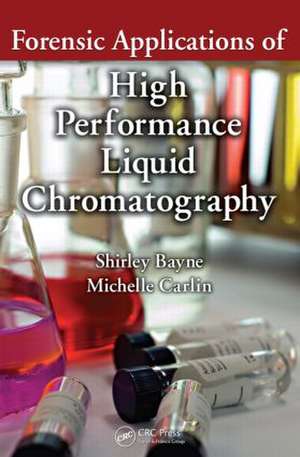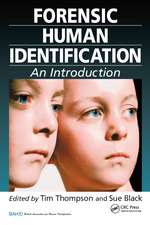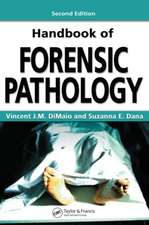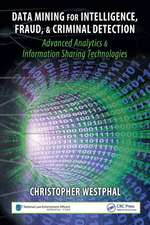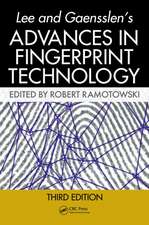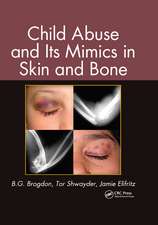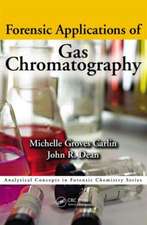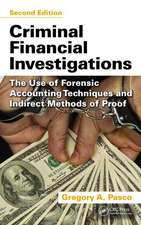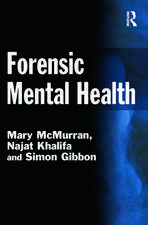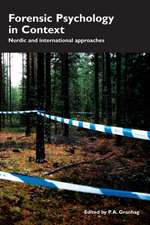Forensic Applications of High Performance Liquid Chromatography: Analytical Concepts in Forensic Chemistry
Autor Shirley Bayneen Limba Engleză Paperback – 15 ian 2010
Focusing chiefly on the reverse phase HPLC mode of separation, this volume examines:
- The history of HPLC and the theory behind the separation process
- The requirements for successful analysis and best practice tips
- The modes of separation and detection most appropriate for forensic science applications
- HPLC method development and evaluation
- The quality aspects of laboratory operation
- Troubleshooting HPLC systems and analyses
- Applications of HPLC within the field of forensic science
An instructor’s manual with lecture slides, test bank, objectives, and exercises is available with qualifying course adoption
Preț: 487.64 lei
Preț vechi: 573.70 lei
-15% Nou
Puncte Express: 731
Preț estimativ în valută:
93.31€ • 97.23$ • 77.26£
93.31€ • 97.23$ • 77.26£
Carte tipărită la comandă
Livrare economică 03-17 aprilie
Preluare comenzi: 021 569.72.76
Specificații
ISBN-13: 9781420091915
ISBN-10: 1420091913
Pagini: 276
Ilustrații: 149 black & white illustrations, 12 colour illustrations, 42 black & white tables
Dimensiuni: 156 x 234 x 15 mm
Greutate: 0.41 kg
Ediția:New.
Editura: Taylor & Francis
Colecția CRC Press
Seria Analytical Concepts in Forensic Chemistry
Locul publicării:Oxford, United Kingdom
ISBN-10: 1420091913
Pagini: 276
Ilustrații: 149 black & white illustrations, 12 colour illustrations, 42 black & white tables
Dimensiuni: 156 x 234 x 15 mm
Greutate: 0.41 kg
Ediția:New.
Editura: Taylor & Francis
Colecția CRC Press
Seria Analytical Concepts in Forensic Chemistry
Locul publicării:Oxford, United Kingdom
Public țintă
UndergraduateCuprins
Introduction to HPLC. Basic Principles of HPLC. Mobile Phase Preparation, the Use of Buffers, and Sample Preparation. Modes of Separation. Detection Systems. Method Development in Reversed Phase HPLC. System Suitability. Qualification, Validation, and Verification. Quality Systems. Troubleshooting HPLC Systems. Forensic Applications of HPLC. Glossary. Index.
Recenzii
"I showed this book to many of my students and asked them to read it and they told me that they could understand the concepts of HPLC properly for the first time from this book. Even a number of my own concepts were clarified a great deal. … This is the first book to the best of my knowledge specifically dealing with the forensic applications of HPLC, and a very good one at that. Highly recommended for all forensic scientists and chemists, especially those who are working in separation science.
— Anil Aggrawal in Anil Aggrawal's Internet Journal of Forensic Medicine and Toxicology
" … easy to read and lively enough to engage students and keep their interest.
— C. F. Poole, Wayne State University, in Chromatographia
"The book chapters maintain a balance between theoretical considerations and examples and practical solutions. … designed as a textbook for university students studying analytical chemistry, applied chemistry, forensic chemistry, or other courses with an element of HPLC within the course curriculum, this volume is an invaluable guide for those in the early stages of their forensic analysis careers."
—International Journal of Environmental Analytical Chemistry
— Anil Aggrawal in Anil Aggrawal's Internet Journal of Forensic Medicine and Toxicology
" … easy to read and lively enough to engage students and keep their interest.
— C. F. Poole, Wayne State University, in Chromatographia
"The book chapters maintain a balance between theoretical considerations and examples and practical solutions. … designed as a textbook for university students studying analytical chemistry, applied chemistry, forensic chemistry, or other courses with an element of HPLC within the course curriculum, this volume is an invaluable guide for those in the early stages of their forensic analysis careers."
—International Journal of Environmental Analytical Chemistry
Descriere
Maintaining a balance between practical solutions and the theoretical considerations involved in HPLC analysis, this volume uses real-life examples likely to be found within a forensic science laboratory to explain HPLC from a forensic science perspective. Focusing on reverse phase HPLC mode of separation, each chapter includes a key point summary, a series of questions (where appropriate) and a list of books and journal articles to give further insight into the topics covered. The text is appropriate for first time users as well as those pursuing post-graduate study or in the early stages of their forensic analysis career.
